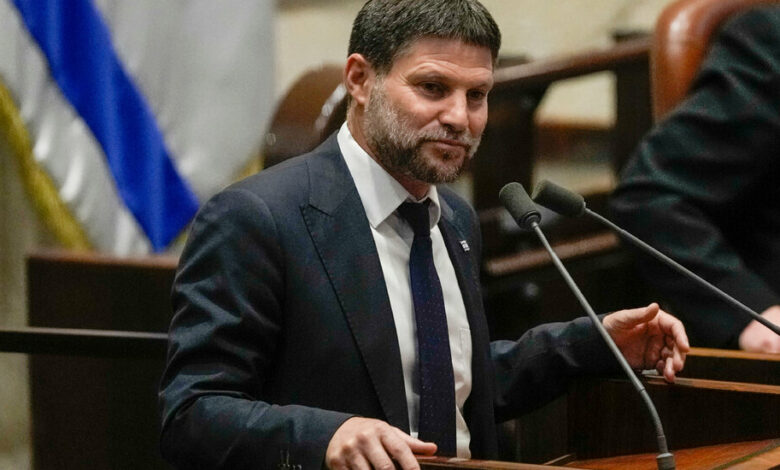Israeli minister will release Palestinian funds if settlements are legalized, officials say

The Palestinian Authority has lurched from crisis to crisis for years, struggling to pay its arrears amid declining international aid. Israel has often withheld taxes it collects on behalf of the authority in an attempt to punish its leadership. At other times, Israel has sent tens of millions of dollars to prop it up.
But many called the current economic situation in the West Bank the most difficult yet.
After the Hamas-led attack on October 7, tens of thousands of Palestinians who had been working in Israel were barred from entering, creating mass unemployment overnight. Israeli military raids, road closures and tightened checkpoints have further stifled the Palestinian economy.
Before the war, Mahmoud Abu Issa, 53, earned more than $2,000 a month — an enviable salary in the impoverished West Bank — as a construction worker in Israel. He has been unemployed since Israel banned most Palestinian workers, except for irregular assignments as a day laborer for about $10 a day.
His son, who worked with him in Israel, had started building a house before the war began. Because their wages dried up, the house is still not finished, he said.
“We sit around day and night hoping that something will change,” Mr Abu Issa said. “But there is nothing.”
Under agreements between the two sides, Israel collects and transfers hundreds of millions of dollars in tax revenue to the Palestinian Authority. Mr. Smotrich has withheld these funds, which constitute the bulk of the Palestinian government’s budget, exacerbating the budget crisis.
As a result, the Palestinian leadership has struggled to pay its workers, who number at least 140,000, according to officials in the Palestinian Authority’s Finance Ministry. Many have received only partial salaries for years, often at irregular intervals; last month, most received only 50 percent of their wages.
Shadi Abu Afifa, a father of four who lives near Hebron, saw his $930 monthly salary as an officer in the authority’s security forces halved last month. He said his family had stopped buying cooking gas and given up other modest luxuries such as home internet in an effort to save money.
“If the economy improves, maybe we will start to feel some hope again,” Mr Abu Afifa said. “Because we are in a bad, suffocating situation right now – the war, the unemployment, everything mixed together.”
U.S. officials have pressured the Israeli government to release the funds, fearing that further economic problems could lead to more violence in the West Bank. Jake Sullivan, the national security adviser, this week called for the funds to be released “without further delay.”
Last month, after three European countries announced they would recognize a Palestinian state, Mr. Smotrich announced he would not renew the waiver — which expires on July 1 — that protects Israeli banks from legal liability for working with Palestinian banks.
Since they do not have their own currency, Palestinians generally use Israeli shekels. If Palestinian banks want to offer shekel accounts, they must maintain ties with Israeli banks and trust them to process shekel transactions.
The Israeli Finance Ministry has granted a waiver to safeguard Israeli banks since 2017, according to Lilach Weissman, a ministry spokeswoman. If the waiver is not extended, Israeli banks are likely to cut ties with their Palestinian counterparts, banking experts say.
“The consequences would be bad and dangerous for everyone,” said Akram Jerab, chairman of the board of Quds Bank, which has 31 branches in the West Bank.
At a Cabinet meeting late Thursday, which took place after midnight, Mr. Smotrich agreed to temporarily extend the waiver for four months, said Eytan Fuld, a spokesman for the minister. What would happen next was unclear.
If he ultimately follows through on his threat to let the waiver expire, it could also have economic consequences for Israel, experts say. Palestinian merchants would not be able to use banks to pay Israeli suppliers for imported goods. And there would be no way for Palestinians to pay Israel for essential goods such as fuel, water and electricity, said Azzam al-Shawwa, a former Palestinian banking supervisor.
“Israel’s trade is intertwined with Palestine,” Mr. al-Shawwa said in an interview. “Palestine is one of Israel’s largest trading partners. Is Smotrich ready to lose that?
Rawan Sheikh Ahmad contributed report.




